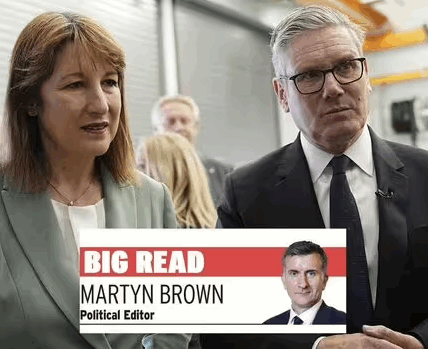A report produced by the Department for Work and Pensions found that less than 10% of the predicted sum would be released for investment.

The Chancellor has identified pensions as a vehicle for economic growth (Image: Getty)
The Chancellor’s plan to use surplus funds from final salary pension schemes to boost the UK economy could have very little impact, it has been revealed. It had been hoped that the plan would release around £160bn of funds for investment but a Whitehall assessment at the Department for Work and Pensions (DWP) earlier this year found that just a fraction of that sum would be released.
According to a report produced by civil servants, the plan to use expected surpluses in occupational schemes that would allow businesses to offload their pension liabilities to insurance companies would see just £11 billion invested. Rachel Reeves has identified pensions as a means of funding growth in the economy and outlined proposals for pension megafunds in her Mansion House speech last November. A pensions bill currently progressing through Parliament will enable pension fund trustees to release trapped surplus funds — a move that Rachel Reeves said would boost investment in British businesses and drive economic growth.

The Chancellor hoped that the scheme would release up to £160bn for investment (Image: Getty)
After years of deficits, during which the value of their obligations exceeded their assets, hundreds of final salary schemes have recently moved into surplus thanks to higher interest rates.
A report produced by civil servants said: “Although fewer than 700,000 people are actively saving into a private sector defined benefit scheme, the sector remains a significant market within the UK economic landscape.”
It added: “Across around 5,000 schemes, around nine million members are being supported with assets of around £1.2tn.”
An impact assessment produced by the DWP has called for legislation to be passed giving trustees the power to access surplus funds, saying that a failure to act would mean that “an opportunity to benefit members, businesses and to drive economic growth would be missed.”

A DWP report found that just £11bn would be freed up for investment (Image: Getty)
Writing for the Pension Insurance Corporation, an independent expert, John Ralfe, said: “Forget about £160bn of pension surpluses just waiting, as Rachel Reeves said, to be paid out to ‘drive growth and boost working people’s pension pots’.
“The DWP figures estimate just a fraction of this – under £12bn – will be paid out over the next 10 years, mainly because most companies want a full buyout with an insurance company.
“And the bill contains no details of how pensions will be protected if cash is withdrawn. Member security must be a priority with strict rules on repaying amounts if funding deteriorates.”
The pensions minister Torsten Bell said: “I have read the impact assessment, and I am satisfied that, given the available evidence, it represents a reasonable view of the likely costs, benefits and impact of the leading options.”
A Government spokesperson said: “There are billions of pounds in surplus funding currently in private sector Defined Benefit (DB) pension schemes, with 3 in 4 schemes in their strongest funding position in decades.
“Our proposals will unlock funds to boost the economy, remove barriers to growth and ensure working people and businesses are able to benefit from the opportunity these assets bring.”

